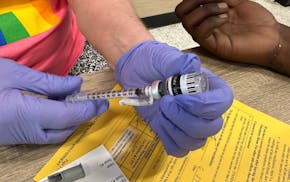When Sue Abderholden took over NAMI Minnesota in 2001, just weeks after the Sept. 11 terrorist attacks that traumatized the nation, the organization had a $160,000 budget and 2.5 staff positions. Nearly a quarter-century later, it's a $3 million organization with a staff of 37.
And now Abderholden has announced her retirement as executive director of what has become the state's most prominent mental health advocacy organization. She will remain in the job through October as NAMI launches a leadership transition process.
"Sue Abderholden's leadership has been nothing short of transformational," Jessica Gourneau, board president of NAMI Minnesota, said in a statement.
"Her fierce advocacy at the Legislature, her strategic partnerships across sectors, and her tireless work to create culturally responsive, person-centered care have set the gold standard for mental health advocacy."
NAMI Minnesota — the acronym stands for National Alliance on Mental Illness — works to promote development of community mental health programs and services, change public attitudes about mental illnesses, improve access to services and increase opportunities for recovery.
Since Abderholden took over, the landscape around mental illness has undergone a sea change: less discrimination against people with mental illnesses and more reliable funding streams using Medicaid instead of grants.
"It's viewed as part of the health care system in a way it wasn't before," Abderholden, 70, told the Minnesota Star Tribune on Saturday. "We've seen a huge shift in attitudes. People talk about it now.
"When I went to the Capitol after I started at NAMI, people were not talking about mental health. Now legislators talk about how it's important to them and their families. People testify and tell their stories."
Abderholden, a Macalester College graduate who earned a master's degree in public health administration from the University of Minnesota, previously held leadership positions at social service organizations such as Arc of Minnesota and PACER Center, as well as U.S. Sen. Paul Wellstone's Minnesota office. Her family had a foster care license for years, providing respite care for families of children with disabilities and youth aging out of foster care.
She drove legislative reforms to Minnesota's mental health system, helping to pass more than two dozen laws reshaping education, health care, housing and criminal justice to better serve people living with mental illnesses.
The laws required mental health training for teachers, secured mental health screenings for individuals entering jails and helped reform commitment laws to promote voluntary engagement in treatment.
They also expanded crisis and early intervention services and fought to restrict the use of solitary confinement for imprisoned individuals with mental illnesses.
NAMI Minnesota began in 1976 when a group protested the closing of Hastings State Hospital and advocated for using the savings for community services. The Legislature provided a little over $1.5 million for Minnesota's first community mental health program, then called Sharing Life in the Community.
During Abderholden's tenure, mental health awareness increased locally and nationally, and discrimination decreased. A recent study ranked Minnesota as sixth in the nation for mental health care.
But a shortage of mental health professionals, especially in rural areas, persists.
"There were always shortages," Abderholden said. "COVID did hurt a bit. But now more people do telehealth, which is more convenient."

Man arrested in woman's death at home in St. Paul's Frogtown neighborhood

Warren Buffett shocks shareholders by announcing his intention to retire at the end of the year

After nearly a quarter-century, Sue Abderholden is stepping down as head of NAMI Minnesota

![Pa Cheng Vang visits his burnt home that is being renovated in St. Paul, Minn., on Thursday, Sept. 19, 2024.] Pa Cheng Vang and his partner Ker Lor lo](https://arc.stimg.co/startribunemedia/7UEJWBRTRVCFRNFX2AK2QI5MSU.jpg?w=600&h=600&auto=format%2Ccompress&cs=tinysrgb)